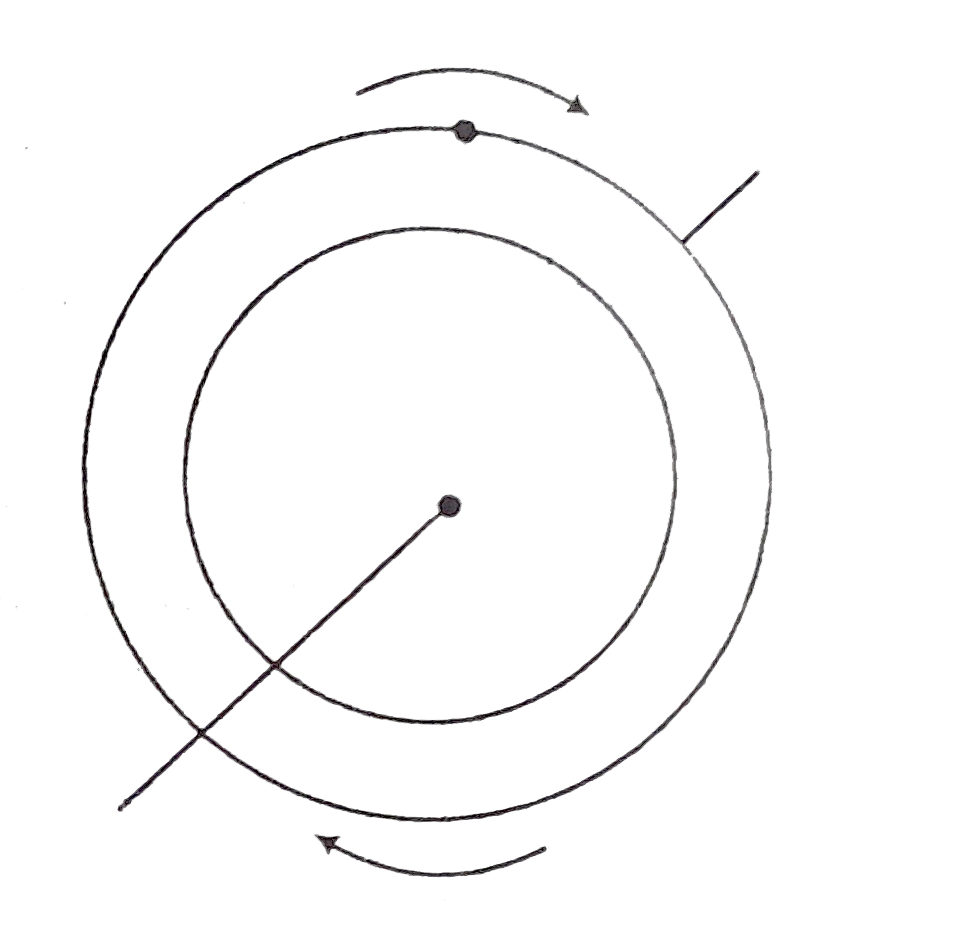A thin horizontal circular disc is roating about a vertical axis passing through its centre. An insect is at rest at a point near the rim of the disc. The insect now moves along a diameter of the disc to reach its other end. During the journey of the insect, the angular speed of the disc.
continuously decreases
continuously increases
first increases and then decreases
remain unchanged
The correct Answer is:C
As external torque is zero, i.e. τ=0, so angular momentum is conserved.
∴Iω=a constant =C
or ω=CIorω∝1I
When insect moves towards centre Idecrease. Hence ω increases. As insect moves away from centre towards diametrically opposite point, I increases. Then ω decreases. Thus ω first increases and then decrease.
Similar Questions
A horizontal disc is rotating about a vertical axis passing through its centre. If an insect moves from centre to rim then the angular momentum of the system
View SolutionA horizontal disc is rotating about a vertical axis passing through its centre. If an insect moves from centre to rim then the angular momentum of the system
View Solution
Knowledge Check
- Question 1 - Select One
A thin horizontal circular disc is rotating about a vertical axis passing through its centre. An insect is at rest at a point near the rim of the disc. The insect now moves along a diameter of the disc to reach other end. During the journey of the insect, the angular speed of the disc
Aremains unchanged.Bcontinuously decreases.Ccontinuously increases.Dfirst increases and then decreases. - Question 2 - Select One
A disc is free to rotate about a smooth horizontal axis passing through its centre of mass. A particle is fixed at the top of the disc. A slight push is given to the disc and it starts rotating. During the process.
 Aonly mechanical energy is conservedBonly angular momentum (about the axis of rotation) is conservedCboth mechanical energy and angular momentum are conservedDNeither the mechanical energy nor the angular momentum are conserved.
Aonly mechanical energy is conservedBonly angular momentum (about the axis of rotation) is conservedCboth mechanical energy and angular momentum are conservedDNeither the mechanical energy nor the angular momentum are conserved. - Question 3 - Select One
A circular disc is rotating in horizontal plane about vertical axis passing through its centre without friction with a person standing on the disc at its edge. If the person gently walks to centre of disc then its angular velocity
AincreasesBdecreasesCdoes not changeDbecomes zero
A circular disc rotates about an axis passing through its centre with a certain angular velocity. Suddenly a small piece of the disc is broken from the edge and falls down. Then
View SolutionRadius of gyration of a uniform circular disc about an axis passing through its centre of gravity and perpendicular to its plane is
View SolutionA horizontal disc rotates freely about a vertical axis through its centre. A ring, having the same mass and radius as the disc, is now gently placed on the disc. After some time, the two rotate with a common angular velocity, then
View SolutionA metallic circular disc having a circular hole at its centre rotates about an axis passing through its centre and perpendicular to its plane. When the disc is heated:
View SolutionA metallic circular disc having a circular hole at its centre rotates about an axis passing through its centre and perpendicular to its plane. When the disc is heated:
View Solution

